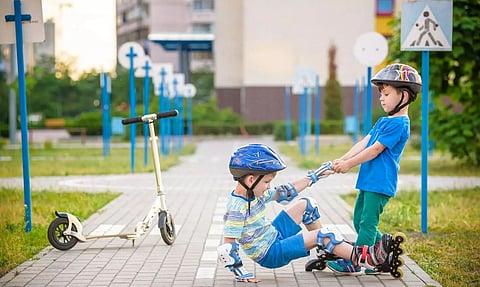
- Home
- Live Blog
- Breaking News
- Top Headlines
- Cities
- NE News
- Sentinel Media
- Sports
- Education
- Jobs

As parents we invariably experience a strong urge to protect our children from life's hardships. We want to ensure that they do not go through the struggles that we went through as children. Yet at the same time, we also have this innate wish that our children are able to face all the obstacles of the world with flair. Well the key here is resilience.
All children encounter stress in their daily life, although as adults we may not be able to identify it. Stress for a child could be falling ill often, starting a new school, change of an educator, teasing in the classroom/neighbourhood/cousins etc. For adults these may appear to be mundane matters but for a child that is a huge part of their world.
All children possess the ability to cope with stress and face adversities. Resilience is the ability to bounce back from adversity, failure and stress. Resilience is not something one is born with, it is a skill that can be developed over time as children grow. When children have the skills and the confidence to confront and work through their problems, they learn that they have what it takes to confront difficult issues. The more they bounce back on their own, the more they internalise the message that they are strong and capable.
Positive connections with immediate family members and the community at large play a very important role in enabling children to develop their resilience skills. When children are aware that no matter what, they have significant adults in their life having their back, (by being available for them) it provides the necessary confidence to step out into the world and face obstacles with aplomb. Many a times despite their hard work and perseverance children may not be able to successfully face the obstacles they meet with. A warm, supportive, loving space to rest and rejuvenate thus makes a big difference in their ability to get back on the field with renewed vigour.
There are several ways in which we (as parents) can enable our children to build on their resilience skills. First and foremost, try to keep aside quality time with your children. It is essential for young children to know that they have unconditional support from their parents. This helps ensure that they come to their parents in times of crisis rather than getting mislead by other adults or at certain times by peers. As adults, we often find ourselves telling our children 'Parents are your greatest well-wishers'. Well instead of simply saying it, show it with your support and understanding. Certain times yes, you may be struggling within to give that little or lot of advice, "share about in our days etc", but well as per your children their days are different! So you should communicate at a level where they can relate thereby helping to create more effective communication patterns. Secondly, resist the urge to "fix that problem", instead sit down with your child and discuss probable options one may use to resolve the crisis at hand. This will enable your child to develop his/her own perspectives on situations/topics. Yes, I do agree it is time-consuming for sure, but this habit will go a long way in ensuring your child's emotional well being in the future. It is important to help children develop healthy risk taking. Maybe next time you go grocery shopping encourage your child to take the trolley to the billing counter and participate in the payment process. Encourage your child to explore their areas of interest even if they are uncertain regarding them. Unless one explores how would one know what one wants or doesn't!
Many a times despite all efforts we fail. Make that okay for your child. Help them to identify and label the emotion in that very moment. Whenever my 6 year old comes up to me and shares "Mamma I am so sad today, I make it a point to say -Do you mean a little part of you is sad?" And then we sit and try to figure out what made that little part sad. It is important keep difficult emotions in parts and not embrace them as a whole. The same goes for feelings.
As significant adults our role is very important in demonstrating resilience. How we face and handle crisis in our day to day life does set an example. Children are keen observers hence they unconsciously pick up on our stresses as adults. As a family engage in healthy coping skills – maybe a walk together, deep breathing exercises or a fun in-house zumba session. The more natural we keep it the better children develop their resilience skills.
Yes, despite our best, at certain times we may have a mini pessimist in the house. Well we do have one at home! Each time simply acknowledge their feelings of distress, help them relax and aid to reframe their thoughts to positive ones. Positive affirmations are also helpful. But that is a topic that we shall discuss some other time.
Also Watch: